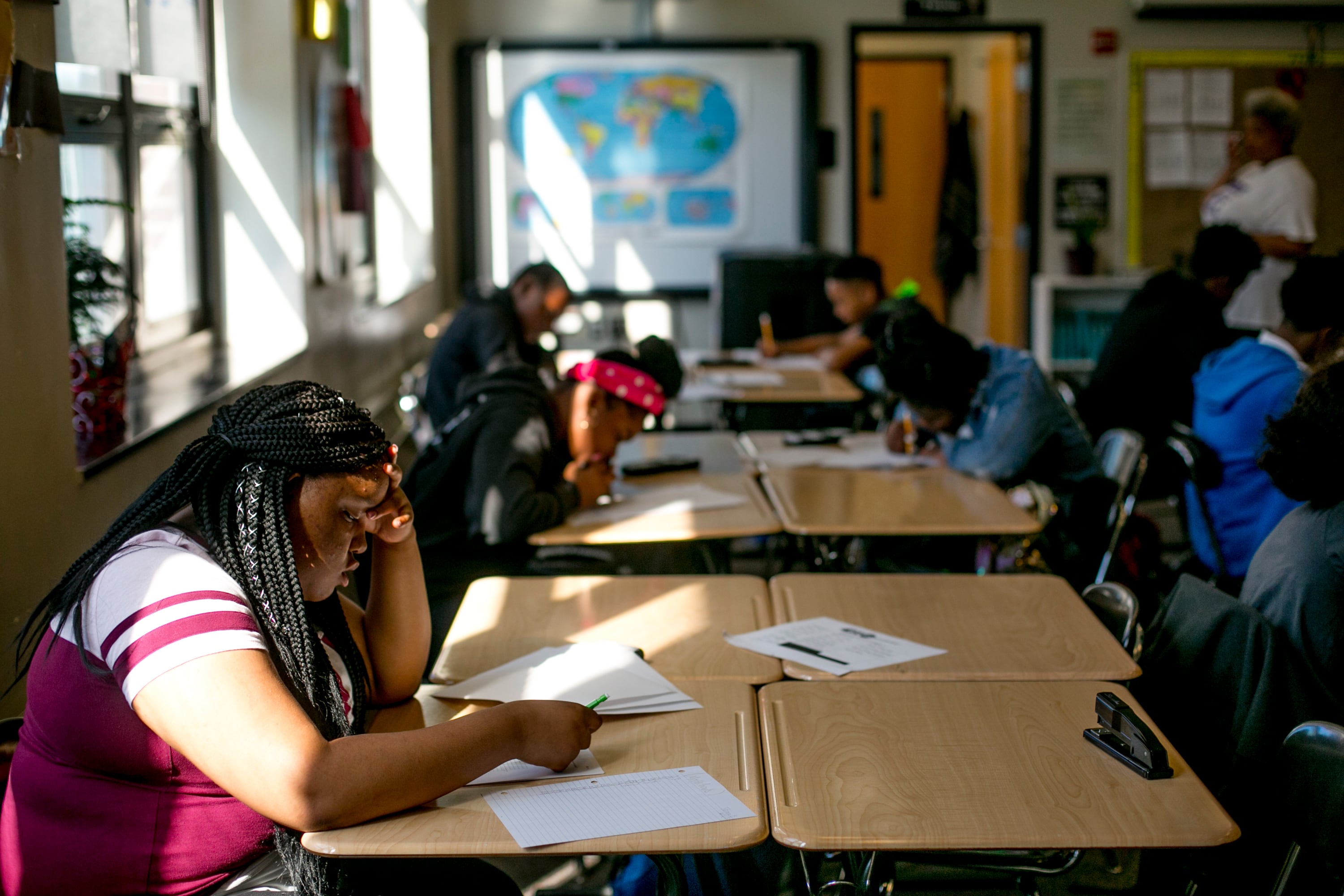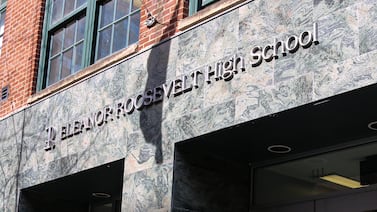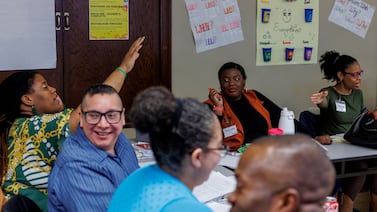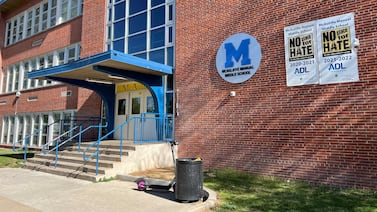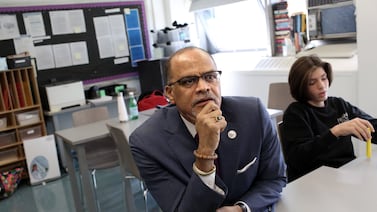Every K-8 student in the Detroit Public Schools Community District has access to summer school programming this year, school officials said this week.
During a school board committee meeting Monday, Superintendent Nikolai Vitti said the district will offer five weeks of summer school for young students at 26 locations, paid for with help from community partners.
High school students also will be able to take classes at seven locations and online during the summer. That instruction is paid for by the district.
The goals and focus for students attending summer school through Detroit Public Schools Community District differs depending on the grade level.
At the high school level, the emphasis remains on course recovery for incoming sophomores, juniors, and seniors. Vitti said this option has become crucial for some 12th graders, who “are able to graduate because they take those final courses” during the summer.
The classes for K-8 students will provide an opportunity to continue their learning over the summer, so they can be “at or above their grade level for the fall, and … make up skills that they may have lost from the previous year,” Vitti said.
Summer learning is an important tool to keep students on track after the school year comes to a close. Last year Detroit students showed minor improvements in standardized test scores, a promising sign after a major disruption in learning during the COVID pandemic. But students in Detroit charter and traditional public schools continue to perform well below the state average.
A review of a handful of summer programs held in urban districts throughout the country suggests students reap multiple benefits from summer classes. The RAND Corporation analyzed five school districts’ summer programs and found they gave many children “short-term gains in mathematics.” The analysis also found “promising evidence that, after two consecutive summers, students with high attendance outperformed their peers in mathematics and English language arts.”
These students also showed “stronger social-emotional competencies.” The value of such programs is especially pronounced in urban school districts with higher numbers of students from low-income homes, who are at a greater risk of falling behind than their peers, the report said.
Here’s what you need to know about this year’s summer programming:
New funding makes summer school a reality
These programs are free to DPSCD students. Thousands have applied for previous summer programs through DPSCD but Vitti does not anticipate a completely full roster of summer students. This year, summer school instruction for K-8 students is funded through a new grant from the Ballmer Group and United Way for Southeastern Michigan providing up to $2,000 per student. The summer program marks an expansion of offerings in comparison to last summer, when the district offered just a few options for students.
The new funding does not cover summer instruction for high school students, Vitti said, and the district will continue to rely on district funds for high school summer classes.
DPSCD teachers and contractors will make up most of the summer school teaching staff.
Important dates and summer schedules
Enrollment for DPSCD summer school will begin May 1 and continue through May 24. Forms to enroll will be available online and at all schools in the district.
Classes start June 24 and last until July 26.
Morning sessions for K-8 students will focus on academics, such as math and language arts. In the afternoon, sessions will center on art and physical education.
Meanwhile, incoming 10th, 11th and 12th graders who need at least one credit for their graduation requirements in social studies, science, English language arts, and math will be able to take that class over the summer. They can access coursework online and at seven locations staffed with teachers from 9 a.m. to 1 p.m. The location is determined by the school students normally attend during the school year.
Internet access is also available at these sites and at recreation centers and local libraries through the Connect 313 program, which is focused on expanding internet access for Detroit residents.
Improving access and equity for students
The school locations offering summer programs for students all have air conditioning, part of an effort to keep the instruction “consistent,” Vitti said.
“In years past when we offered summer school in non-air conditioned buildings, because of obviously the heat in the summer, there are days that are well beyond 90 degrees in the building and individual classrooms,” he said. Those high temps have forced the district to cancel classes, which disrupts learning, eats into parents’ work schedules, and impacts child care, Vitti added.
The district is continuing other services that help students to thrive during the regular school year. Students who received free and reduced-price breakfasts and lunches will continue to receive those meals during summer school.
Summer school locations are determined by the school K-8 students normally attend during the school year. Students who live more than three-quarters of a mile from the summer school site are eligible for bus transportation.
Summer school sites for K-8 students
Summer school classes will be held at multiple sites across the district. Here are the sites and times of programming:
- Barton Elementary School, 8:45 a.m. to 4:15 p.m., for students from Barton, Sampson-Webber
- Bennett Elementary School, 8:45 a.m. to 4:15 p.m., for students from Bennett, Maybury
- Carstens Elementary School, 8:45 a.m. to 4:15 p.m., for students from Carstens
- Charles Wright Academy of Arts and Science, 8:45 a.m. to 4:15 p.m., for students from Charles Wright, Bow, John R. King
- Coleman A. Young Elementary School, 8:45 a.m. to 4:15 p.m., for students from Coleman A. Young, Bagley, Cooke STEM
- Davison Elementary-Middle School, 8 a.m. to 3:30 p.m., for students from Davison
- Duke Ellington Elementary School, 8:45 a.m. to 4:15 p.m., for students from Duke Ellington, A.L. Holmes, Blackwell
- Durfee Elementary School, 8 a.m. to 3:30 p.m., for students from Durfee, Noble, Thirkell
- Earhart Elementary School, 8 a.m. to 3:30 p.m., for students from AOA at Logan, AOA High School
- Edmonson Elementary School, 8:45 a.m. to 4:15 p.m., for students from Edmonson, Edison, Palmer Park (Montessori)
- Emerson Elementary-Middle School, 8 a.m. to 3:30 p.m., for students from Emerson, Edison
- Fisher Magnet Lower Academy, 8 a.m. to 3:30 p.m., for students from Fisher Magnet, Brewer, Pulaski
- FLICS School, 8 a.m. to 3:30 p.m., for students from FLICS, Bates, PRMX, Marygrove
- Golightly Education Center, 8 a.m. to 3:30 p.m., for students from Golightly, Burton, Virtual School, Spain
- Gompers Elementary-Middle School, 8 a.m. to 3:30 p.m., for students from Gompers, Ann Arbor Trail, Burns, Dixon, Dossin, Mann
- Greenfield Union Elementary-Middle School, 8 a.m. to 3:30 p.m., for students from Greenfield Union, Nolan
- Hutchinson Elementary-Middle School, 8:45 a.m. to 4:15 p.m., for students at Hutchinson, Bunche, Chrysler, Garvey, Nichols
- Mackenzie Elementary-Middle School, 8:45 a.m. to 4:15 p.m., for students at Mackenzie, Carver STEM, Gardner, Henderson
- Marion Law Academy, 8:45 a.m. to 4:15 p.m., for students from Marion Law, Brenda Scott, DIA, Mason
- Mark Twain School for Scholars, 8 a.m. to 3:30 p.m., for students from Mark Twain
- Marquette Elementary-Middle School, 8:45 a.m. to 4:15 p.m., for students from Marquette, Carleton, Wayne
- Munger Elementary-Middle School, 8 a.m. to 3:30 p.m., for students from Munger, Clippert, Neinas
- Priest Elementary-Middle School, 8:45 a.m. to 4:15 p.m., for students from Priest
- Roberto Clemente Learning Academy, 8 a.m. to 3:30 p.m., for students from Roberto Clemente, Harms
- Ronald Brown Academy, 8 a.m. to 3:30 p.m., for students from Ronald Brown, Hamilton, J.E. Clark
- Schulze Academy for Technology and Arts, 8:45 a.m. to 4:15 p.m., for students from Schulze, Bethune, Palmer Park (Gen Ed), Pasteur, Thurgood Marshall, Vernor
Summer school sites for high school students
All schedules run 9 a.m. to 1 p.m.
- Cass Technical High School, for students from Cass Tech, Crockett Midtown, DIA, DSA, Douglass
- Detroit Lions Academy, for students from Detroit Lions
- East English Village Preparatory Academy at Finney, for students from EEVPA, Denby, Osborn, Pershing
- Mumford High School, for students from Mumford, Central, Cody, Henry Ford, Northwestern
- Renaissance High School, for students from Renaissance, CMA, Marygrove, Virtual HS
- Southeastern High School, for students from Southeastern, Davis Aerospace, King
- Western International High School, for students from Western, Academy of the Americas
Robyn Vincent is a reporter for Chalkbeat Detroit, covering Detroit schools and Michigan education policy. Contact her at rvincent@chalkbeat.org.


